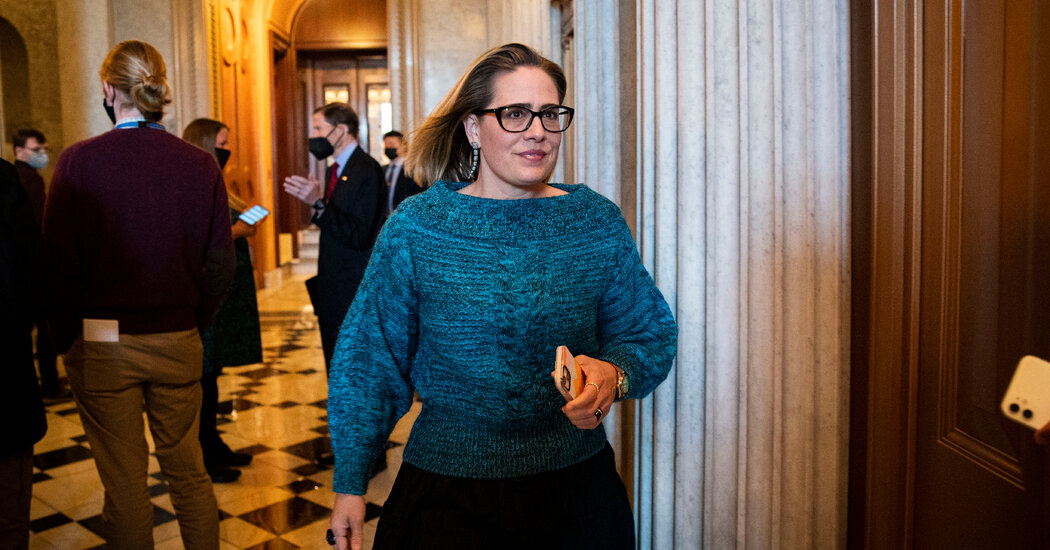
PHOENIX — A rift between Senator Kyrsten Sinema and fellow Democrats back home in Arizona deepened on Saturday as the state party formally rebuked Ms. Sinema for refusing to change the Senate’s filibuster rules to pass sweeping voting rights legislation.
The censure from the party’s executive board was symbolic, but it crystallized a growing sense of anger and frustration among liberal activists and Democratic voters aimed at Ms. Sinema.
They accuse Ms. Sinema, a first-term senator, of impeding key parts of President Biden’s agenda, and have vowed to withhold donations and search for a liberal primary challenger when she is up for re-election in two years. Activists have staged protests outside her office and begun a hunger strike to urge Ms. Sinema to support changing the Senate rules to allow voting-rights legislation to pass with a simple majority of the 100 senators rather than the 60 votes required under Senate rules.
But she has steadfastly refused, and reiterated her opposition to scrapping the filibuster in a Jan. 13 speech on the Senate floor, arguing that the parliamentary tactic “has been used repeatedly to protect against wild swings in federal policy.”
Ms. Sinema said that she supported the Democratic voting-rights legislation, but that she believed doing away with the filibuster would worsen America’s political divisions.
The opposition from Ms. Sinema and Senator Joe Manchin III of West Virginia to changing the 60-vote threshold required in the Senate to move major legislation forward has all but doomed the Democrats’ hopes of passing federal voting legislation.
The Arizona Democratic chairwoman, Raquel Terán, said on Saturday that the party’s executive board had voted for the censure because of Ms. Sinema’s “failure to do whatever it takes to ensure the health of democracy.”
Ms. Terán said voting rights were already being threatened in Arizona, and cited Republican proposals to limit mail-in voting and a widely criticized Republican-run audit of the 2020 election results in Maricopa County, home to Phoenix and 60 percent of the state’s registered voters. Democrats nationally cite a barrage of Republican legislation aimed at the rules for voting, as well as counting and certifying votes as a fundamental threat to American democracy.
“The ramifications of failing to pass federal legislation that protects their right to vote are too large and far-reaching,” Ms. Terán said in a statement.
Hannah Hurley, a spokeswoman for Ms. Sinema, said in a statement that Ms. Sinema had been consistent about her opposition to changing the filibuster.
“Kyrsten has always promised Arizonans she would be an independent voice for the state — not for either political party,” Ms. Hurley said. “She’s delivered for Arizonans and has always been honest about where she stands.”
Arizona’s other senator, Mark Kelly, also a Democrat, said last week that he would support weakening the filibuster rules to pass voting rights legislation.
Ms. Sinema, a onetime Green Party-affiliated activist, has won praise from Republicans and infuriated Democrats by bucking her own party as a senator who represents a closely divided swing state.
In being censured by her own party, she joins a club that includes former Senator John McCain, former Senator Jeff Flake and the state’s sitting Republican governor, Doug Ducey, who have all been censured by the Arizona State Republican Party.
Understand the Battle Over U.S. Voting Rights
Why are voting rights an issue now? In 2020, as a result of the pandemic, millions embraced voting early in person or by mail, especially among Democrats. Spurred on by Donald Trump’s false claims about mail ballots in hopes of overturning the election, the G.O.P. has pursued a host of new voting restrictions.
Barrett Marson, a Republican political strategist, said that those censures of prominent Arizona Republicans by their own party had little effect, and that he doubted the censure alone would hurt Ms. Sinema’s political fortunes. But, he said Ms. Sinema’s problems go far deeper than the censure vote.
“The censure in and of itself means absolutely nothing,” Mr. Marson said. “It’s a feckless move. However, Senator Sinema certainly has a broader problem than just a censure from the party faithful.”
Those problems include fierce discontent among Democratic voters, who have signaled that they might prefer a liberal alternative to Ms. Sinema, such as Representative Ruben Gallego, a Phoenix congressman some activists are hoping to draft into a primary.
The fund-raising group Emily’s List, a major supporter of Ms. Sinema in her 2018 run for Senate, said it would pull its support, and she has recorded flagging numbers among her Democratic base in recent polls.
A new survey of Arizona voters, conducted this month, but not yet released, by OH Predictive Insights, a Phoenix polling and research firm, found a 30-point gulf in support for Arizona’s senators among Democrats. While 74 percent of Democrats said they had favorable views of Mr. Kelly, just 42 percent of Democrats felt the same about Ms. Sinema.
At the same time, the survey also found some evidence that Ms. Sinema could be vulnerable among the wider electorate as well. On the whole, by a nine-point margin, voters said they viewed her unfavorably, while they were about evenly split on their opinions of Mr. Kelly.
“To be under all this pressure for so long, and she hasn’t wavered — you’ve got to give a little credit for that,” said Mike Noble, the chief of research at OH Predictive Insights. “But she’s not going to be on a lot of people’s Christmas card lists next year.”




